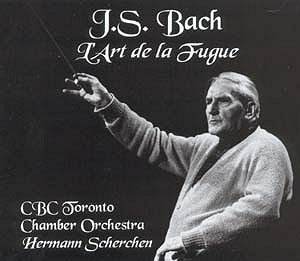Myriam Scherchen, the daughter of the great German
conductor Hermann Scherchen, has set up the Scherchen Foundation to
keep the memory of her father alive. The label she set up, Tahra Productions,
has released dozens of historic productions over the years, by Scherchen
and other great conductors. This 2-CD set is a recording of Scherchenís
orchestration of Bachís Art of Fugue, recorded for the Canadian Broadcast
Company shortly before Scherchenís death in 1965.
As one can expect, this recording was made with modern
instruments - for the most part; Kenneth Gilbert is heard on harpsichord
- and is a performance typical of the practices in vogue at the time.
Yet what stands out in this recording is the extraordinary orchestration
by Scherchen, which gives this music a unique tone.
Scherchenís tempi are relatively fast for the time
- none of the lush, thick, slow string playing that is often heard in
1960s recordings of the work. His chamber orchestra is lean, and, in
spite of the recording techniques of the time, each instrument can be
clearly heard. Scherchen uses dynamics a great deal to emphasize certain
parts of the score. There is great tension in the 7th fugue, with the
strings starting out with a crescendo, before winds and other instruments
come in to add subtlety and balance the powerful string section.
Fugue 9 is very disappointing. Kenneth Gilbert plays
this on solo harpsichord - somewhat daring for the time - but unfortunately
his instrument is out of tune, and this can be clearly heard at several
points in the lower register. But he nevertheless gives a dynamic performance
of this fugue. He is heard again alone in several of the canons, and
this use of a solo harpsichord adds some more intimate sections to this
generally extroverted orchestration.
Scherchenís orchestration is most impressive in the
two longest fugues, number 12, the triple fugue, and number 18, the
unfinished quadruple fugue. Here he uses the full range of instruments
to create almost symphonic movements, which nevertheless do not betray
the spirit of the music.
This is a historical document that shows a unique approach
to Bachís Art of Fugue. While far from current performance practice,
Scherchen offers a window onto another, equally valid approach, which
puts the music in a different light. With the exception of the solo
harpsichord parts, this is a very moving recording.
Kirk McElhearn
CONTACT DETAILS
http://www.tahra.com/


